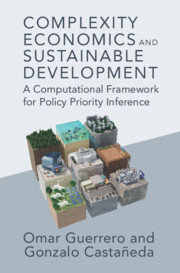 Complexity Economics and Sustainable Development
Complexity Economics and Sustainable Development Book contents
- Frontmatter
- Dedication
- Contents
- Figures
- Tables
- Foreword
- Acknowledgments
- Abbreviations
- Part I A Complexity Approach to Sustainable Development
- 1 Introduction
- 2 Policy Prioritisation, Complexity, and Agent Computing
- 3 Relevant Data and Empirical Challenges
- 4 A Computational Model
- 5 Calibration and Validation
- Part II A Global View of Sustainable Development
- Part III A Focalised View of Sustainable Development
- Bibliography
- Index
2 - Policy Prioritisation, Complexity, and Agent Computing
from Part I - A Complexity Approach to Sustainable Development
Published online by Cambridge University Press: 04 January 2024
- Frontmatter
- Dedication
- Contents
- Figures
- Tables
- Foreword
- Acknowledgments
- Abbreviations
- Part I A Complexity Approach to Sustainable Development
- 1 Introduction
- 2 Policy Prioritisation, Complexity, and Agent Computing
- 3 Relevant Data and Empirical Challenges
- 4 A Computational Model
- 5 Calibration and Validation
- Part II A Global View of Sustainable Development
- Part III A Focalised View of Sustainable Development
- Bibliography
- Index
Summary
This chapter formulates an analytical toolkit that incorporates an intricate – yet realistic – chain of causal mechanisms to explain the expenditure–development relationship. First, we explain several reasons why we take a complexity perspective for modelling the expenditure–development link and why we choose agent-based modelling as a suitable tool for assessing policy impacts in sustainable development. Second, we introduce the concept of social mechanisms and explain how we apply them to measure the impact of budgetary allocations when systemic effects are relevant. Third, we compare different concepts of causality and explain the advantages of an account that simulates counterfactual scenarios where policy interventions are absent.
Keywords
- Type
- Chapter
- Information
- Complexity Economics and Sustainable DevelopmentA Computational Framework for Policy Priority Inference, pp. 22 - 52Publisher: Cambridge University PressPrint publication year: 2024


